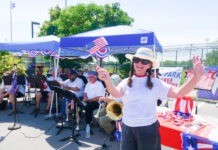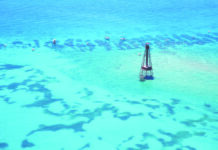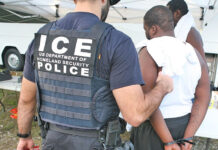Florida Keys residents are paying particularly close attention to news reports this week showing Russian warships arriving in Havana Harbor, just 90 miles from Key West. The four Russian ships, which include a nuclear-powered submarine and a frigate, reportedly passed offshore of Key Largo while en route to the communist island nation, which has long been a key Russian ally.
The news has prompted vivid memories of historical parallels for some longtime Key West residents who recall the nail-biting tension during the Cuban Missile Crisis of 1962, when the U.S. and Russia were on the brink of a nuclear war that could have started 90 miles from Key West.

“I was in second or third grade at the time, and I remember convoys of Army trucks rolling down Flagler Avenue,” recalled resident Kurt Lewin, whose father, Kermit, was a former Key West mayor. “The Army took over Key West. There were HAWK missiles and barbed wire at the beaches. Soldiers in Army tents were set up all over Wickers Field and military aircraft were leaving from Boca Chica 24 hours a day.”

Lewin remembers the nuns at his Catholic grade school leading his class in daily duck-and-cover drills
This week, the U.S. and Russian militaries both have made public statements downplaying any risk or aggression that the ships’ arrival represents, saying the Russian presence in Cuba is part of a planned five-day military exercise that may next take them to Venezuela.
But tensions between the two countries have been precariously high since February 2022, when Russia invaded Ukraine, which has received support from the U.S. to aid in their defense.
“Based upon the international principles of freedom of navigation, we don’t anticipate any impact or influence on Coast Guard District Seven’s operations related to the presence of any allied or foreign vessels in the joint operating area,” Lt. Cmdr. John William Beal, public affairs officer for the U.S. Coast Guard District Seven, told the Keys Weekly on Wednesday, June 12. “My understanding is that any out-of-area deployers that do not routinely operate in the Florida Straits or Caribbean will be remaining in international waters outside of our U.S. territorial seas. The U.S. Coast Guard, in conjunction with our Department of Defense partners and other government agencies, constantly monitors the activity of foreign vessels operating near U.S. territorial waters in support of national defense and homeland security efforts.”
In a statement to the Keys Weekly, Cuban-born U.S. Congressman Carlos Gimenez, whose South Florida district includes the Florida Keys, tied the presence of the Russian ships to the oppressive communist regime that has been in place in Cuba since Fidel Castro took over the country in 1959.
“Make no mistake, the murderous military regime in Havana poses a direct national security threat to America,” Gimenez said. “Our community understands this firsthand being only 90 miles away from the shores of the very same dictatorship that supports Putin’s barbaric, illegal invasion of Ukraine. Instead of granting concession after concession to the Castro regime in Cuba, which is actively inviting Russian warships to our seas, President Biden must impose consequences on Communist Cuba to curb this pathetic, dangerous behavior.”
When the Russian ships arrived on Wednesday, June 12, they were greeted with a 21-gun salute from the Cuban military, reports state.
Despite the Russian ships’ nuclear war capability, the Russian government has said none of the ships are currently carrying nuclear weapons, according to a BBC News report.
“’We of course take it seriously, but these exercises don’t pose a threat to the United States,’” the Pentagon said, according to the BBC. “‘The Russian moves were consistent with ‘routine naval visits that we’ve seen under different administrations,’ press secretary Sabrina Singh added.
“But Cuba’s foreign ministry says none of the vessels has nuclear arms on board, and their five-day visit does not pose a threat to the region. Russia has sent warships to Cuba in the past and the two nations are long-standing allies — but the timing of these particular exercises stands out. Coming amid growing tensions over Russia’s full-scale invasion of Ukraine in 2022, the operation is being interpreted by some as saber-rattling by Moscow,” states the BBC story.
For Key Wester Kurt Lewin, this week’s headlines have prompted memories of the 1962 conflict.
“It was an interesting time,” he said. “It was all-consuming in a way, because the presence of the Army was so undeniable, but I was too young to be afraid, and life went on. We went to school every day. The bars downtown were doing a booming business, of course. But I probably think about those days now more than I did back then, though I know my parents were scared to death.”





















